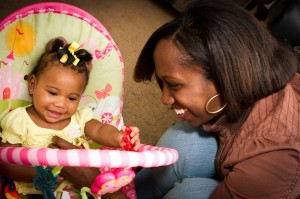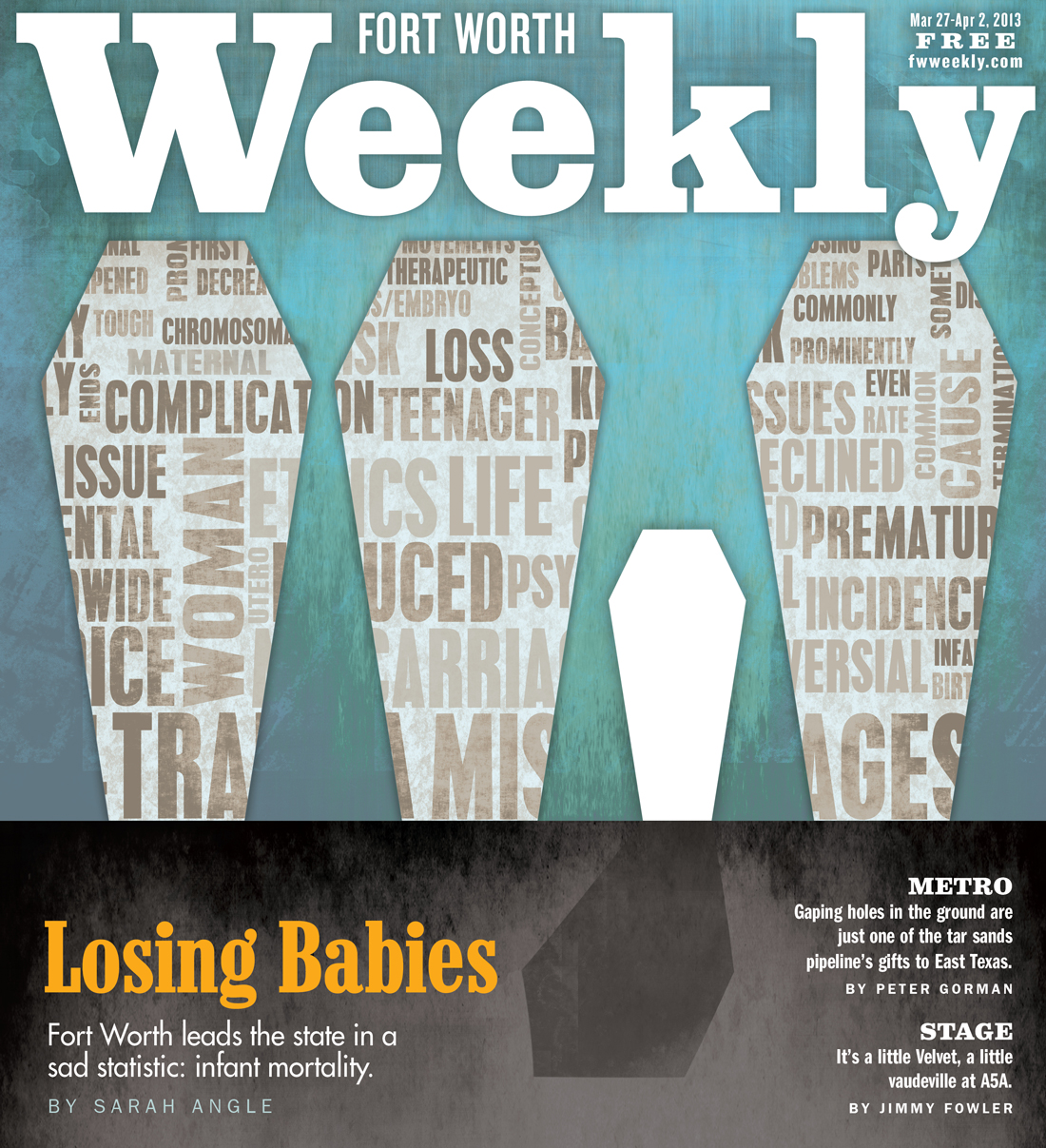My baby kicked and moved until the day he died,” said Jodie Kennedy.
She thought everything was fine. It was her second pregnancy. But her amniotic fluid was leaking, making her feel weak and dizzy all the time. She didn’t know that what was happening was out of the ordinary, and she didn’t have a doctor to tell her it was.
It was 2007, and Jodie had just relocated to Fort Worth from New Orleans after Hurricane Katrina. The young mother didn’t have money for a doctor and didn’t know how to apply for Medicaid. So when she was four months pregnant, her son died.
“Oh … it hurts,” she said. “I could have saved my son’s life.”
If Jodie, 29, had gotten medical care early in her pregnancy, a doctor would have seen that her cervix was too weak to carry the weight of the developing child and could have given her injections to prevent premature labor. She knows that now because she delivered a healthy baby girl last summer. This time, with help from a federally funded program operated by a local charity, she went to the doctor right away and got the care she needed to carry the baby to term.
“If I knew what I know now … my son would be here,” Jodie said. “Knowledge is power. It can save somebody’s life, especially when it comes to a baby.”
These days, health officials and charity providers in Tarrant County are trying to turn some sad knowledge into power to help save the lives of more babies in North Texas. According to the most recent statistics available, Fort Worth has the highest infant mortality rate in the state, meaning that a higher percentage of babies here die before their first birthday than in any other major city in Texas. But it’s not just Fort Worth — the North Texas region in general leads the state in infant mortality as well.

Fort Worth, Arlington, and Dallas had the highest infant mortality rates of Texas’ large cities: Fort Worth had 9 infant deaths per 1,000 live births compared to 8.2 in Arlington and 7.5 in Dallas.
The problem also seems to be getting worse. In January, the Tarrant County Public Health agency released its most comprehensive report to date on infant mortality. It showed that the number of infant deaths in both Fort Worth and Arlington increased in 2010, even though the total number of babies born decreased during that year.
The causes of infant mortality are complicated, and none of the health officials contacted by Fort Worth Weekly would hazard a guess as to why North Texas cities seem to be so dangerous to the health of fetuses and newborns.
“If I knew the answer to that I would fix it,” said Ann Salyer-Caldwell, associate director of community health promotion at Tarrant County Public Health. Many factors add to the picture of infant mortality, she said, “and we have to dig deep to find all the issues that are affecting it.”
Some of the conditions that lead to infant deaths here carry out the same theme as elsewhere in the state: A mother’s long-term lifestyle affects her chances of having a healthy baby — infant mortality rates are higher for obese women, for instance. Mortality rates also tend to vary by race.
But at least one key factor here seems clear: Tarrant County has the worst percentage in the state of pregnant mothers receiving prenatal care. Premature babies are more likely to die shortly after birth than full-term babies. Moms with sexually transmitted infections are more likely to lose their babies. Both those factors trace back to a lack of medical care during pregnancy.
And the medical care picture for women, particularly poor women, isn’t getting any better in Texas. The legislature has drastically cut state funding for family planning and women’s healthcare in recent years, leading to clinic shutdowns across Texas, including one in Arlington.
When the state’s ban on funding for Planned Parenthood clinics led the federal government to end its women’s health program in Texas, state officials organized what they said was a replacement program. But that program has been criticized in Tarrant County and elsewhere for providing a much lower level of accessible care than in the past. And local health officials said Texas rules make it difficult for poor pregnant women to qualify for Medicaid.
“The painful truth is, many women are going without preventive healthcare that could save lives,” said Danielle Wells, a spokeswoman for Planned Parenthood of Greater Texas.
********













“Losing Babies” began with Jodie’s plight. She was pregnant, poor, and in her second pregnancy. But she lost the baby because she couldn’t afford a doctor and didn’t know how to apply for Medicaid. By her third pregnancy, her problems were solved. Oh, she was still poor, but now she had taxpayer-provided prenatal care and everything turned out peachy.
It’s fair to ask whether women who can’t afford prenatal care will be able to afford postnatal care. Will they be able to feed, house, and clothe their children? Or will taxpayers take care of that too by way of T.A.N.F., W.I.C., and Section 8?
We as a nation cannot afford this any longer. The best solution is for Jodie to keep her pants on. She can’t procreate her way out of poverty.
You are a disgusting individual. Your comments are ignorant at best, and chauvinistic at worst.
I lost my daughter. And had insurance. Paid all my medical bills. Had trained professionals helping me. Nothing could save my daughter.
Thinking that you would actually cover something worthwhile I picked this issue up. It’s all about uninsured infant deaths…..my sweet angel would have had ANY monitary care needed. And sure as hell had every bit of medical care. Yet still, she is gone.
I go see her every night. Losing my daughter has shattered my world. Not only do I thank you for your poorly written article, but I thank you for;
-not researching the actual issues.
-picking only the side of a poor uninsured woman.
-FOR YOUR COVER THAT DEPICTS OUR CHILDREN’S RESTING PLACE AS A VAMPIRE COFFIN.
Women around the world are upset about the cover image. Mothers who have lost their children all the way in Kenya are nauseated by your choice of illustration.
How about foot prints? An angel teddy bear? No no no a vampire coffin.
Just so you know, my daughter along with everyone else’s child for the past 65 years have been buried in a rectangle casket. Just like everyone else. Smaller, but for the most part the same. Your choice to not think more about the fact, “if Fort Worth is one of the leaders in infant death, maybe all of these mothers and fathers would like to see a poorly drawn mock of their child’s casket…” makes me sick.
You are obviously not a mother. Or your conscience would have stopped you from that cover.
I lost my daughter. And had insurance. Paid all my medical bills. Had trained professionals helping me. Nothing could save my daughter.
Thinking that you would actually cover something worthwhile I picked this issue up. It’s all about uninsured infant deaths…..my sweet angel would have had ANY monitary care needed. And sure as hell had every bit of medical care. Yet still, she is gone.
I go see her every night. Losing my daughter has shattered my world. Not only do I thank you for your poorly written article, but I thank you for;
-not researching the actual issues.
-picking only the side of a poor uninsured woman.
-FOR YOUR COVER THAT DEPICTS OUR CHILDREN’S RESTING PLACE AS A VAMPIRE COFFIN.
Women around the world are upset about the cover image. Mothers who have lost their children all the way in Kenya are nauseated by your choice of illustration.
How about foot prints? An angel teddy bear? No no no a vampire coffin.
Just so you know, my daughter along with everyone else’s child for the past 65 years have been buried in a rectangle casket. Just like everyone else. Smaller, but for the most part the same. Your choice to not think more about the fact, “if Fort Worth is one of the leaders in infant death, maybe all of these mothers and fathers would like to see a poorly drawn mock of their child’s casket…” makes me sick.
You are obviously not a mother. Or your conscience would have stopped you from that cover.
A classic liberal response. Heather deftly avoids the substance of her adversary’s argument by calling him names. She deserves a B-. Had she included more trendy terms such as ‘racist’ and ‘homophobe’ she would have rated an A.
I really dislaike it when the current media exploits a tragedy, throws a bunch of incongruent “facts/data” together and comes to an illogical erroneous conclusion (which conveniently conforms to their ideology). The young woman was a displaced person from the Katrina tradgedy 2005 (statistics show that a hurricane of that magnitude has occurred once in 80 years in N.O., the last being 1926- although other less significant hurricanes have occurred in the interval). The Tarrant county community- unfairly vilified in this “article” offered shelter and housing through (limited) federal assistance, and now has provided a tax funding base for many who are not supporting themsleves and choose to stay. There are of course too many unanswered questions here: The pregnancy occurred two years after the storm,-2007- so where was her family? Why didn’t she go back to more familiar surroundings? Why not contact the Feds who provided the initial monetary and other relief? Why not contact a religious or other charity organization and ask for help? Even assuming that she felt well and her aminiotic fluid was not leaking-where did she plan to give birth–at home? JPS? In order to stay here she must have been a participant in relief efforts, so why NOT familiarize yourself with Medicaid?
Was there any planning going on? When she started to feel badly (or even suppected she was pregnant )why not just go to JPS or another ER-all hospitals treat the uninsured, which is one reason why standard helath insurance is so expensive. The Docs and their hospital facilities featured in the report have been around for many years. I do not know of anyone who has been turned away from JPS-even folks from other countries. If you want to be intellectually honest–you will see that Federal mortality data bases do not support the author’s conclusions regarding Tarrant county being the highest in infant mortality, although that sentiment has been used more than once in this publication to support FWW’s “guilt trip” agenda. You, John, are quite within your rights as a taxpayer or even as a normal citizen supporting the social compact, to ask: now what? The incessant urge to blame everyone else for one’s own problems is a road to nowhere…and the real crime against this young lady is that she is encouraged by the authors of this and similar pieces to futility waste her life blaming the community which reached out to help her.
Sorry about the abundant typos, I hope that you get the point, however…